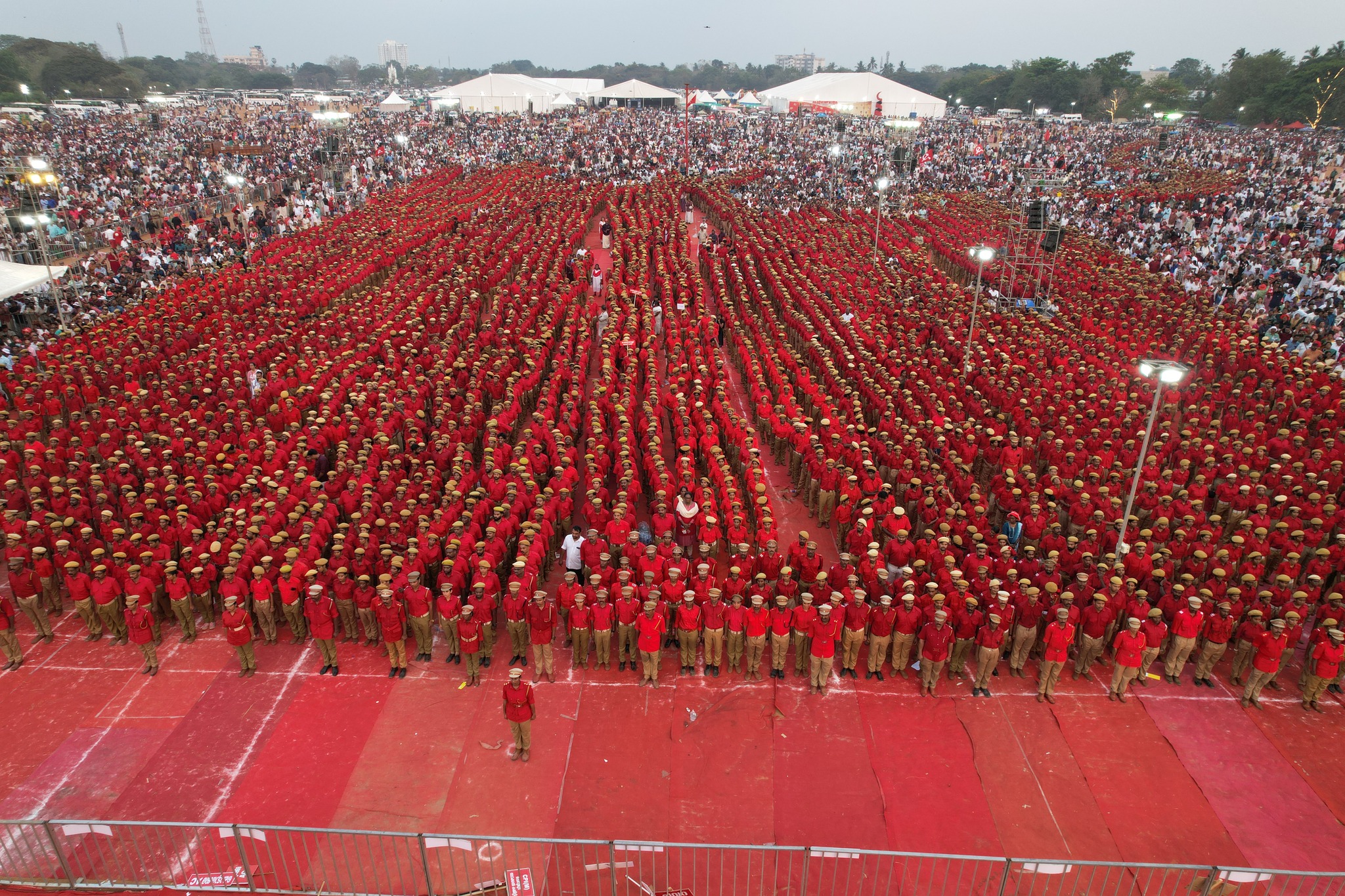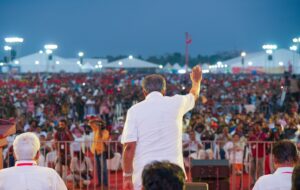Published Mar 13, 2025 | 5:00 PM ⚊ Updated Mar 13, 2025 | 5:00 PM

From the CPI(M) state conference in Kollam. (Facebook)
Synopsis: Following the Kerala state conference of the CPI(M), the internal dissent in the party came out in the open. While the party’s Polit Bureau and Central Committee Coordinator Prakash Karat asserted that the party remains a highly unified force, the reality on the ground suggests otherwise.
The 24th CPI(M) Kerala state conference, which concluded on 9 March, was meant to reinforce the party’s organisational strength from top to bottom.
Instead, it has exposed deep cracks within, fueling discontent among sidelined senior leaders and raising questions about the party’s internal cohesion.
While the party’s Polit Bureau and Central Committee Coordinator Prakash Karat, in his parting remarks at the conference, asserted that the party remains a highly unified force, the reality on the ground suggests otherwise.
The simmering discontent over leadership appointments, generational shifts, and factional realignments has put the party in an uneasy predicament — one it had sought to avoid ahead of crucial elections.
However, CPI(M) state secretary MV Govindan told the media that the state conference infused party comrades and the public with renewed confidence, ensuring a stronger and more unified path ahead.
Even though the state conference sought to project a united front, cracks began to show almost immediately.
On 10 March, just a day after the event wrapped up, dissenting voices emerged, exposing deep fissures over leadership appointments and the selection process for key committees.
The most vocal among the disgruntled leaders was former MLA and Pathanamthitta district secretariat member A Padmakumar, who openly criticised the party’s decision to overlook him for a seat in the newly constituted state committee despite his 52 years of service.
His frustration was directed at the inclusion of Health Minister Veena George — a two-time MLA with only nine years in the party — as a permanent invitee to the committee.

Chief Minister Pinarayi Vijayan during the state conference
While the CPI(M) justified her elevation based on “administrative acumen,” Padmakumar saw it as a deviation from the party’s principle of prioritising organizational work over parliamentary success.
“She became an MLA twice and then a minister. She is capable, but when someone reaches the upper echelons purely based on parliamentary activities, naturally, there will be differing opinions. At least someone needs to speak out,” he told reporters.
His dissatisfaction spilled onto social media, where he posted (and later deleted) a Facebook note expressing feelings of “betrayal, deception, and humiliation.”
Although he later reaffirmed his loyalty to the party, his remarks sparked significant internal discussions.
Meanwhile, the Pathanamthitta district committee meeting on Wednesday, 12 March, did not address the public dissent expressed by Padmakumar.
Sources indicated that the issue may be discussed at the CPI(M) State secretariat meeting on Friday, and further action could be decided.
“We did not discuss Padmakumar’s remarks as such matters are usually taken up in meetings with state committee leaders. The issue has been conveyed to the state secretary, but no directives have been received yet,” said the district committee.
The meeting primarily focused on campaigns against the Union government, including protest marches to central government offices. Padmakumar was present at the meeting.
The fallout was not limited to Pathanamthitta. In Kannur, the CPI(M) stronghold, the exclusion of veteran leader P Jayarajan from the state secretariat triggered indirect protests.
His son, Jain Raj, posted a cryptic Facebook message, seemingly referencing his father’s omission by resharing an old post from CPI(M) state secretariat member M Swaraj that read: “Did you expect a different fate in present-day India?”
Jayarajan, a state committee member for 27 years, reportedly voiced his discontent internally but chose to remain silent in public.
His exclusion paved the way for MV Jayarajan’s elevation to the secretariat, further fueling speculation about shifting power dynamics within the Kannur unit.
Adding to the unrest, N Sukanya, a leader of the CPI(M)-affiliated Janathipathya Mahila Association, posted a Che Guevara quote: “If you tremble with anger at every injustice, you are my comrade.”
Though she later clarified that the post had nothing to do with the party, many saw it as a veiled critique of the leadership reshuffle.
In the capital district of Thiruvananthapuram, discontent stemmed from the exclusion of veteran leader Anavoor Nagappan from the state secretariat due to the party’s age cap (75 years). This decision left Thiruvananthapuram without a representative in the state unit’s top decision-making body.
The expected replacement, Kadakampally Surendran, was also overlooked, fueling further speculation.
His Facebook profile picture update — a throwback to 2016, when he addressed a massive crowd — was widely interpreted as a subtle expression of dissatisfaction.
Though Surendran dismissed such interpretations as “media-driven nonsense,” his silence on the matter was telling.
As dissatisfaction brewed, CPI(M) leadership moved swiftly to contain the fallout.
Central Committee Member AK Balan issued a stern warning, reminding party members that “communist consciousness” demands discipline and that public criticism of leadership decisions only benefits “class enemies.”
Sensing an opportunity, the BJP extended an invitation to Padmakumar to switch allegiances — an offer he declined. However, CPI(M) leadership took his public remarks seriously, with Pathanamthitta District Secretary Raju Abraham stating that the party had “taken a serious view” of the incident.
Despite the internal discord, the CPI(M) pushed forward with a reconstituted state secretariat of 17 members and an expanded 89-member state committee, introducing 17 fresh faces.
Key changes included the elevation of MV Jayarajan, KK Shailaja, and CN Mohanan, while senior leaders like Balan, PK Sreemathi, and Anavoor Nagappan stepped down due to the party’s retirement age policy.
The inclusion of younger leaders like Democratic Youth Federation of India (DYFI) State Secretary VK Sanoj and Kochi Mayor M Anilkumar signals an attempt to bridge the generational divide.
However, the sidelining of veterans like P Jayarajan and Kadakampally Surendran has raised concerns about factional alignments influencing promotions.
The appointment of Veena George as a special invitee also highlights a strategic shift — administrative performance being prioritised over traditional organisational work.
While this move may modernise the party, it has also ruffled feathers among long-serving cadres.
Several senior leaders have privately expressed disappointment over their exclusion from the secretariat despite their decades of experience.
While the CPI(M) insists that appointments are based on ability rather than seniority, internal critics argue that selection norms have been inconsistently applied.
It’s learnt that the Polit Bureau is now deliberating on a draft proposal addressing the status of leaders affected by the age limit policy, which is expected to be finalised at the party congress in Madurai in Tamil Nadu from 2 April to 6 April.
Govindan noted that the party is moving forward in the right direction with a healthy approach.
“From grassroots-level discussions to the state conference, there was robust criticism and self-criticism, allowing us to address and correct certain deviations. Notably, this time, there were no sectional trends or factional debates,” he remarked.
The composition of the new state secretariat presents an interesting contrast in terms of experience.
KK Jayachandran and MV Jayarajan — both with 27 years in the state committee — were promoted to the secretariat. Swaraj and Muhammed Riyas, on the other hand, reached the secretariat within just four years of state committee membership.
Historically, a moderate tenure was the norm for such promotions — both Pinarayi Vijayan and Thomas Isaac waited 11 years before entering the secretariat.
This stark variation has fueled internal debates on inconsistencies in selection criteria.
Amid the murmurs of discontent, Govindan defended the restructuring, stating that those removed due to age limits would still play important roles in the party. He dismissed speculation about VS Achuthanandan’s exclusion, clarifying that special invitee lists would only be finalised after the party congress.
“With the central committee’s approval, they will be actively engaged in their respective party centers, utilising their skills and experience to the fullest. The party stands for inclusion, not exclusion.”
“We have seen the contributions of leaders like S Ramachandran Pillai, who continue to work for the party despite stepping down from committee positions,” he added.
Left commentator NM Pearson notes: “Public discontent of this kind is a rarity in the CPI(M). If we examine these grievances, we can see merit. Some exclusions and inclusions lack a uniform policy. Personal choices seem to have influenced decisions. But such dissenting voices will not affect the party’s stability or its electoral preparations.”
With local body elections on the horizon and the 2026 Assembly elections looming, the CPI(M) cannot afford prolonged internal strife.
The coming months will reveal whether the party can successfully contain these tensions — or whether factional battles will have any impact on weakening its stronghold in the state.
(Edited by Muhammed Fazil.)

